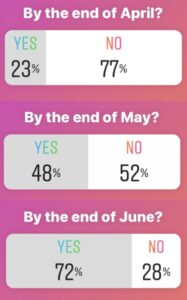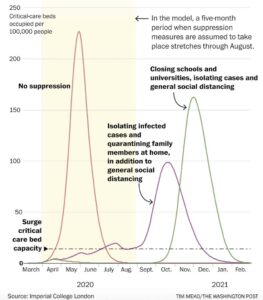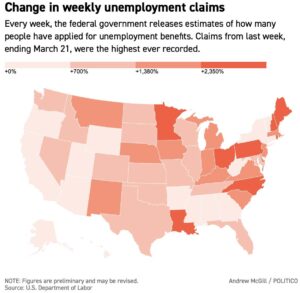“Circumstances don’t make the man, they only reveal him to himself.” -Epictetus
–
“Well, these past weeks have been interesting…”
That is what everyone has been saying. Literally, everyone I speak to – at a safe distance – says that these past weeks have been ‘interesting’ and ‘we’re living in strange times’.
No shit.
We’re currently in the midst of a global pandemic. Because the word ‘pandemic’ is not exactly a new word or a new concept… everyone should understand that this is a serious situation.
But, as we’ve all found out, over the past several weeks, the reactions of people range from absurd to shocking. On one side of the spectrum, we have people that are literally licking toilet seats for a joke. On the other side of the spectrum, we have people who are wearing 5-gallon water bottles on their head.

The market has reacted the same. Two weeks ago, we saw the biggest one-day sell off since 1987, making it the second largest market drop ever. Then, last week, the market rallied for the best day in 90 years! The week also recorded the highest level of volatility ever.

On could argue that the first market sell off was a knee-jerk reaction to the COVID-19 pandemic, with the following market rally being a result of value investors buying when there is blood in the streets.
Another way to look at last week’s market rally is that investors in the United States do not understand what is going on.
Let’s back up just a little bit and look at the United States, as a whole. As the oldest democracy in the world, the US is not quite familiar with any kind of disruption to daily lifestyle. Any political turmoil is very superficial, without much of any impact on the average citizen.

Source: VC
Really, the last time the general US population saw any type of major battle on it’s soil was during the American Civil War. We’ve had events like Pearl Harbor and 9/11, but in general, the country is extremely insulated from any type of armed conflict. This is due to the country’s standing as a world power and very strategic geographical positioning.
When it comes to food shortages, supply chain disruptions, transportation shut downs, or widespread curfews/quarantines, the vast majority of US citizens have no idea. If you combine all of those factors together, you soon get a scenario where that same population has no clue what is about to happen.
To be clear, I am not forecasting an apocalyptic future. I don’t anticipate widespread rioting, severe food shortages, or even significant disruptions to our basic utilities. Furthermore, I wouldn’t be surprised to see the US (and the US dollar, which is being printed at Zimbabwe-like-inflation-rates) come out on the other side even stronger. (More about that soon.)
However, we do have a very serious situation ahead of us that most of the United States doesn’t understand. Last week’s rally in the markets emphasized this problem, as many began to speculate about this crisis coming to an end within the next couple of weeks, or months at most.
That’s when I began to realize that the reasons for this extreme volatility in our markets (and in public actions) was due to the fact that everyone has a different understanding of how this all will play out.
So, right away, I started to do several polls on my social media outlets and amongst my friends and family. Admittedly, these surveys I took are not scientific, but the feedback I received was from a wide variety of people, having different political backgrounds and geographical locations (although mostly in the US).
The exact question I asked was:
“When do you think restaurants, retail, etc. will be back open and full enough to do business? Obviously some people are going to be weird about this whole thing for a while… but what month/year do you think things will mostly be back to normal?”
The answers of when life would return back to normal ranged from the end of April 2020, all the way to 2023. A majority of people answered that things would be back to normal around the end of June(!).

Again, to clarify, I asked when our daily lives would start to be normal, not when our economy would be back to where it was. This is important to understand, as the recovery of our economy depends on when people can get back to work. The longer our economy is closed for business, the longer it will take to recover.
I don’t want to get stuck in the weeds of debating when this whole crisis will come to an end, because, well, nobody knows. Furthermore, there are all kinds of variables that could effect the ultimate outcome.
The important part to understand is that there are a wide range of expectations. People are making drastically different decisions about how they should plan for the next several months – or years.
For those who believe this pandemic will come to an end soon, they are viewing this market crash as a buying opportunity. For those who believe this pandemic will last much longer, they are being patient and waiting on the sidelines in anticipation of more pain ahead.
These opposing opinions are what make a market and economy function properly. There has to be buyers and sellers, or else there wouldn’t be a way to conduct business.
Despite the optimism that this whole ordeal will be over with soon, there is a reality that many people in the United States are completely ignoring. It has to do with the insulation that I previously mentioned, where US citizens literally can not imagine a foreign intruder invading their country (even if that intruder is a virus).
Even more, because the US doesn’t understand what is coming, individual people are not preparing of their own… and I’m not talking about hoarding toilet paper. Making budgeting decisions, altering work habits, creating schedules for their children, practicing social distancing, and even improving hygiene are at the bottom of many people’s lists.
For example, I received this text from a friend last week:

I get what he’s saying – he doesn’t want people to contribute to the hysteria that is surrounding this pandemic. But on the other hand, we can’t just stick our heads in the ground like an ostrich. Pretending that something isn’t happening, or minimizing the potential fall out from this event doesn’t effect the probable results. (Never-mind that it must be a luxury to pretend that nothing is happening!)
If we look at what doctors and scientists are saying, we are much closer to the beginning of this crisis, rather than towards the end. We can also see what is going on in other countries where complete lock downs have been implemented. Based on the information we have, we can expect to have this virus suppressed anywhere between this summer and early 2021.

Source: WP
If you’re reading this as an alarmist warning, you need to check your emotions. What you think and what you feel don’t really matter. What matters right now are projections based on data and facts. If we take a realist view of what’s in front of us, then it’d be wise to plan accordingly.
Yet, that is not what many people want to hear. For example, I received a couple nasty emails in response to an article I wrote about prepping. To be clear, prepping does not mean you go out and hoard a bunch of toilet paper. Prepping just means you accumulate a reasonable amount of supplies before an emergency, and you cycle through those supplies on an ongoing basis. That way when there is an actual crisis, you’re not the one standing in line to buy something that you don’t even need, further exhausting the supply for the general public.
A couple of those emails I received accused me of adding to the toilet paper drought. If someone can’t understand buying supplies years in advance of an actual crisis actually helps with preventing more panic buying, then I don’t know what to say.
Perhaps these same people who don’t understand prepping are also the same people who expect a government hand out when things get tough. One of the emails I received said, “But this was an unexpected Black Swan event that no one could have predicted.”
Ummm… actually… a lot of people predicted this. Bill Gates literally spoke about the risks of a pandemic in 2015.
That’s why you should have emergency supplies and an emergency amount of cash that you keep. That’s the whole point of an emergency. The definition is, “an unforeseen combination of circumstances or the resulting state that calls for immediate action.”
Regardless of how much you have prepared, or what you think is going to happen, now is the time to take a hard look at the reality we are in. Challenge your opinions and take some precautionary measures that may seem ridiculous right now. Simple stuff like streamlining your expenses, saving additional capital for upcoming opportunities, looking for dislocations in the market, and of course, doing what you can to stay safe and healthy.
Remember: We don’t actually know how impactful this pandemic will be to our society and economy. We’re still waiting on many different economic data points, and the spread of the virus is still accelerating in most parts of the world. If last week’s US jobless claims are any preview of what’s to come, then it’s time take this seriously.

Source: Politico




